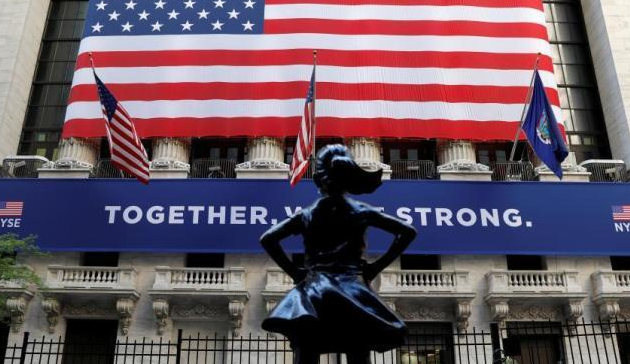Zhongxin Finance, June 14 (Reporter Xie Yiguan) A turbulent night!On June 13 (Monday), local time, the three major U.S. stock indexes suffered a "bloodbath", and the S&P 500 fell directly into a technical bear market.
U.S. stocks plummet, Nasdaq hits record low in more than 1 year
On Monday, the three major U.S. stock indexes opened in a dive, and remained volatile during the session.As of the close, the Dow fell 876.05 points, or 2.79%, to 30516.74 points; the Nasdaq fell 4.68% to 10809.23 points, a new closing low since October 2020; the S&P 500 fell 3.88% to 3749.63 points.

The three major U.S. stock indexes closed at the close.
Large technology stocks fell collectively. Tesla fell 7.10%, Meta fell 6.44%, Amazon fell 5.45%, Google A fell 4.29%, Microsoft fell 4.24%, and Apple fell 3.83%.The six biggest tech stocks lost about $370 billion in market value on Monday.
The US stock market experienced a frightening night, and the European stock market was also unstable.The German DAX index fell 2.43% to 13427.03 points; the French CAC40 index fell 2.67% to 6022.32 points; the UK FTSE 100 index fell 1.53% to 7205.81 points.
With the spread of market panic, the demand for safe-haven increased greatly.U.S. bond yields rose broadly, with 3-year U.S. bond yields up 24.9 basis points to 3.493%, 5-year U.S. bond yields up 22.3 basis points to 3.488%, and 10-year U.S. bond yields up 20.6 basis points to 3.368 %.
"Cash is king" repeated itself, with the U.S. dollar index, which measures the greenback against six major currencies, up 0.89% to 105.0730 in late New York trade on Monday.
High inflation, the US may raise interest rates by 75 basis points
Today, "high inflation" has become a nightmare for U.S. stocks, and every release of monthly CPI data puts U.S. stocks to the test.
On June 10, local time, the U.S. Department of Labor released May CPI data as scheduled, up 1% month-on-month and 8.6% year-on-year.The year-on-year increase in the U.S. CPI hit the highest level since December 1981.
After the data was released, concerns about inflation and the economic outlook spread rapidly, and U.S. bond yields soared.On June 13, the U.S. 2-year and 10-year Treasury yield curves inverted for the first time since April, making people panic about a recession.
Data map: A customer passes by an egg container in a supermarket in San Mateo County, California, United States.Photo by China News Agencyreporter Liu Guanguan
The Fed has already raised interest rates twice in 2022.Ed Yardeni, president of Yardeni Research, said: "The May CPI report showed absolutely no signs of peaking inflation. The report suggests a more hawkish Fed and a higher risk of recession."
At present, high inflation may have become the primary problem to be solved by the US government.According to the Wall Street Journal, Fed officials are considering raising interest rates by 75 basis points this week.At the same time, major international banks including JPMorgan Chase and Barclays also revised their views, predicting that the Federal Reserve will raise interest rates by 75 basis points this week.
JPMorgan's chief U.S. economist Feroli even believes that a 100 basis point rate hike would be a "meaningful" risk attempt.
"The market predicted in the early stage that the year-on-year CPI growth rate of 8.5% in the United States in March this year will be the high point of this round of inflation, but from a realistic point of view, the US inflation worries will exist for a long time, even if the Fed accelerates the process of normalizing monetary policy, but considering There are still structural problems in the supply chain and the U.S. job market, and the marginal effect of rising interest rates on falling inflation is limited," said Wang Yanqing, an analyst at CITIC Construction Investment Futures.
Data map: NYSE.
Where will U.S. stocks go under the risk of interest rate hikes and recession?
Yan Xiang, chief strategist at Founder Securities, believes that the risk of continued interest rate hikes and economic recession triggered by inflation breaking through a historical high of more than 40 years is the core logic behind the sharp decline in U.S. stocks this year.
"On the whole, what affects the changes in U.S. stocks at this stage is the rate of change in valuation, and behind it is the change in interest rates." Yan Xiang said that if the U.S. risk-free rate of return will further exceed 3.5% or even 4.0% in the future, the corresponding The S&P 500 price-to-earnings ratio could fall another 6% to 15%.
The Huatai Securities Research Report pointed out that the U.S. inflation data in May continued to hit a new high in nearly 40 years, and the interest rate has been falling for a long time since the 1980s, and is currently at an extremely low level.This means that the Federal Reserve and the US government have extremely limited room for monetary and fiscal policy, and it is difficult to support US stocks by taking actions such as easing money and lowering interest rates during the subprime mortgage crisis in 2008."U.S. stocks continued to tumble last week and there is no sign of stabilization in the disk, or there is still great uncertainty, and attention should be paid to the risk of further decline." (End)




